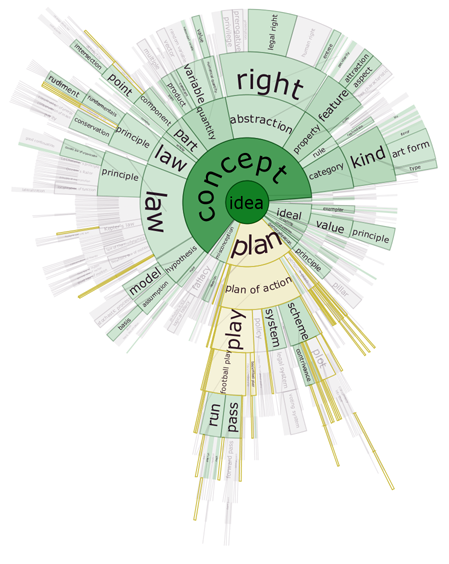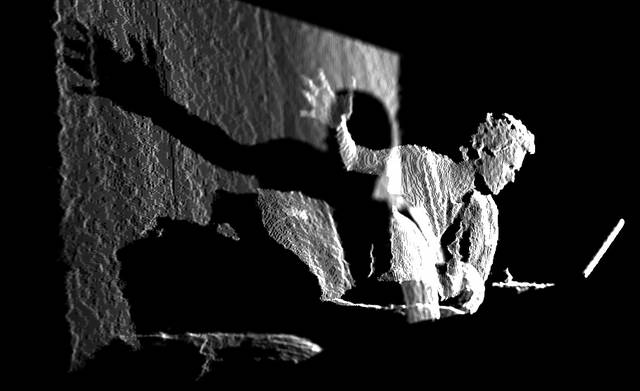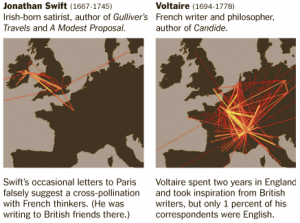Erik pointed me to the WikiMindMap, a tool for visualizing topics in the Wikipedia and navigating them. It uses the mind mapping visual paradigm you see in thinking tools, see previous blog entry.
Ethics Of Game Design
I have recently come across a number of reflections on the ethics of game design prompted in part by a story about the closing down of an installation in 2008 of Virtual Jihadi by artist Wafaa Bilal. (GamePolitics has a number of stories on Bilal and the controversy and here is an interview with Waffaa Bilal about the controversy.)
What did Bilal do? Well, he modified a propaganda game called Night of Bush Hunting (or Quest for Bush) which in turn was a modification of a cheap game Quest for Saddam – a first-person shooter where you hunt Saddam – all to draw attention to the stereotypes of arabs in games.
What’s so special about these games? Gameology has a careful comparison of Quest for Bush and Quest for Saddam. Quest for Bush apparently was just a swap of resources in Quest for Saddam to change who you hunt. A skin of Bush exchanged for a skin of Saddam. The comparative review points out that,
the ease with which the Global Islamic Media Front transformed Quest for Saddam into Quest for Bush, a game that seems to portray jihad, should call attention to the problems with the content of the original. And these are problems which aren’t intrinsic to violent video games. Creating a game that repeatedly portrays the killing of a specific individual or ideology and then distributing that game in a context that sincerely advocates the killing of that individual or ideology precludes any claims about that game’s facetiousness. So whereas a hypothetical DOOM mod that replaced demon sprites with depictions of Arabs would insert xenophobic content where there previously was none, Quest for Bush simply switches the variables on an already political (and probably xenophobic) game’s content.
It seems to me there is now more reflection in the gaming community on games and ethics. A good example is in Gamasutra where Dean Takahashi wrote a longer essay on the Ethics Of Game Design. Some of the issues raised:
- What are the ethics of games that portray identifiable groups (like Russians or Arabs) as bad guys? It obviously saves time to use stereotypical bad guys – no one needs to have explained why you are fighting orcs – but is it unethical?
- Balancing freedom of expression and the ethics of how games might influence players
- The rating of games and whether it works to keep violent (or pornographic) games out of the hands of minors
- Is it enough to just make fun games? Should game designers just focus on the commercial imperative to develop fun games that sell?
- Is it just a game? Do players know the difference? Are players influenced by content even if they know it is just a game?
- Do the intentions of the designer matter in ethics?
- Does the addition of interactivity change the responsibility of the designer? Many works of art portray evil people and we don’t complain, why does being able to play an evil person seem to change the ethical equation?
Some other useful essays include Frank Caro’s Osama bin Fragged: a review of terrorist propaganda games in Ars Technica, Andrew Webster’s Serious games: Ars looks at games that tackle big issues, also in Arts Technica.
Christopher Collins: Research
Ian pointed me to a cool visualization project by Collins and colleagues at UOIT called Docuburst. Docuburst uses WordNet and visualizes the distribution of words in a WordNet tree starting from a node you select. Their code is made available.
Troika Ranch
Folks in the Interactives Lab introduced me to Troika Ranch a dance team that performs with multimedia. You can see examples of what they do on their YouTube channel or on Net Television. They have created a real-time media tool called Isadora:
Isadora is the award-winning, graphic programming environment for Macintosh and Windows that provides interactive control over digital media, with special emphasis on the real-time manipulation of digital video.
Because every performance or installation is unique, Isadora was designed not to be a “plug and play” program, but instead to offer building blocks that can be linked together in nearly unlimited ways, allowing you to follow your artistic impulse.
Is the Internet lying to us?
Yesterday I introduced and moderated a panel on “Does the Internet Lie?” This was at an event celebrating Social Sciences and Humanities research in Canada that also had the President of SSRHC, Chad Gaffield talk. The ExpressNews of the University of Alberta has a nice story about this event, Is the Internet lying to us? – ExpressNews – University of Alberta.
TAPoR portal has moved
The TAPoR Portal has moved to a new server at the University of Alberta. The new location will allow us here to start redesigning it and developing version 2.0. (Or is it now version 3.0?) I underestimated how much work it is to move something so complex. We had to work on bugs, we had to warn users, we had to set up hardware here. Kamal Ranaweera worked very hard to do this – Bravo!
Some links related to the move:
- If you have trouble with the portal go to http://tada.mcmaster.ca/Main/TAPoRPortalMove for information
- If you are interested in the redesign go to http://tada.mcmaster.ca/Main/TAPoRRedesign
Kinect Hacking and Art Round Table: Why it Matters, What You Need to Know
There is a lot of excitement about the Microsoft Kinect and the potential for adapting their vision technology. Wayne sent me a link to this Music Motion Noise blog entry on Kinect Hacking and Art Round Table: Why it Matters, What You Need to Know.
Time to get one.
NY Times: Humanities Scholars Embrace Digital Technology
The next big idea is data according to a New York Times article, Humanities Scholars Embrace Digital Technology by Patricia Cohen (November 16, 2010.) The article reports on some of the big data interpretation projects like those funded by the Digging Into Data program like the Mining with Criminal Intent project I am on.
Members of a new generation of digitally savvy humanists argue it is time to stop looking for inspiration in the next political or philosophical “ism” and start exploring how technology is changing our understanding of the liberal arts. This latest frontier is about method, they say, using powerful technologies and vast stores of digitized materials that previous humanities scholars did not have.
I’m not sure this is a new generation as we have been at this for a while, but perhaps the point is that the new generation is now looking away from theory towards the large-scale data issues.
What stands out about the projects mentioned and others is that the digital humanities and design fields are developing new and subtler forms of large-scale data mining and interpretation that use methods from other disciplines along with a sensitivity to the nature of the data and the questions we want to ask. The image above comes from Stanford’s Visualization of Republic of Letters project. There is nothing new about visualization or network analysis, but digital humanists are trying to adapt methods to messy human data – in other words interpreting the really interesting stuff so that it makes sense of something to someone.
Perhaps we may be able to show that following theses are true and important to the broader community:
- Interesting data has to be interpreted to be interesting. Someone has to pose the questions that make data useful.
- There is too much of data and it is messy; therefore it can’t by interpreted automatically. Real world analysis always involves questions, choices, data curation, mixing techniques, and iterative interpretation of results to generate knowledge.
- Interesting data always has to be explained to someone in some context. Results are only useful knowledge if they are published in some fashion that makes them accessible to an intended audience.
- Humanists have been the curators and interpreters of information which is why the subtle skills of questioning, curating, editing, analyzing, interpreting and representing are all the more needed now. Without humanists (and I include librarians and archivists in this category) who are comfortable with digital data and methods we will have only too much data and too many unused tools.
Thanks to Judith for pointing me to this NYT article.
Save The Words: Adopt a Word
Save The Words is a neat social project set up by the Oxford University Press where you can “adopt” a rarely used word like “egrote” (to feign an illness). If you adopt a word then the idea is that you will use it in various ways. The site suggests you could name a pet with the word, get a tatoo, walk around with a signboard and so on.
Old words, wise words, hard-working words. Words that once led meaningful lives but now lie unused, unloved and unwanted.
You can change all that. Help save the worlds.
The interface to the project is also worth noting. The Flash interface has a wall of words in different fonts and on different surfaces as if photographs of words in contexts. A faux version of our Dictionary of Words in the Wild.
The Escapist : Video Galleries : Extra Credits : So You Want to be a Game Designer
Shannon pointed me to an animation on The Escapist about So You Want to be a Game Designer. The animation provides advice on what people should learn starting with “everything” (as in you need to learn everything.) More realistically the animation suggests that you develop these skills:
- Communication – so you can communicate with a diverse team
- Listening – because you won’t design the game others will with you
- Introspection and ability to take criticism – because there will be lots of criticism
- Disciplined study of games – because playing lots doesn’t make a good game designer
- Understand costs and scope – because games need to be finished and on budget
The animation goes on to discuss how important a knowledge of literature, philosophy and mythology.






